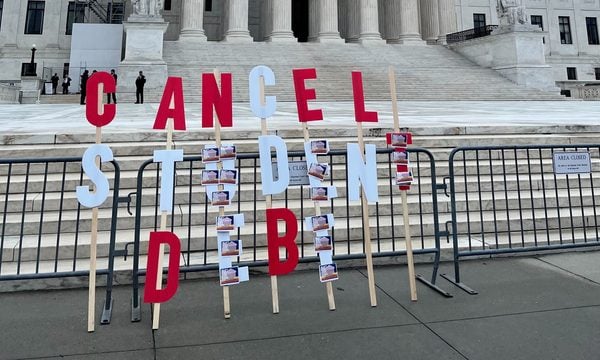How Borrower Defense to Repayment Works
Borrowers defrauded by their schools may seek student loan forgiveness through borrower defense to repayment.

Many, or all, of the products featured on this page are from our advertising partners who compensate us when you take certain actions on our website or click to take an action on their website. However, this does not influence our evaluations. Our opinions are our own. Here is a list of our partners and here's how we make money.
The Borrower Defense to Repayment program can forgive a borrower's federal student loans if they were defrauded or intentionally misled by their school.
The Biden-Harris administration approved the dismissal of nearly $30 billion in debt for 1.7 million borrowers through borrower defense claims and closed school discharge, as of January 2025.
Here's what happens if the Education Department approves your borrower defense application. You receive:
- Full discharge (100%) of federal student loans related to your application.
- Reimbursement of any amount already paid toward the loans, according to regulations.
- Requests to remove negative credit reporting with the credit bureaus.
- Reinstatement of federal student aid eligibility, if you lost it.
Label
» MORE: For-profit colleges become accountable for student outcomes
Who gets relief under the Sweet v. Cardona settlement?
On Nov. 16, 2022, a federal judge in California gave approval on Sweet v. Cardona (formerly Sweet v. DeVos), a settlement of borrower defense claims that will provide up to 264,000 student loan borrowers with at least $6 billion in debt relief. The decision was upheld on Feb. 24, 2023.
The final settlement provides full relief, including student loan forgiveness, payment refunds and credit repair to 200,000 borrowers who filed before June 2022 and attended one of about 150 mostly for-profit schools involved in the case. The remaining 64,000 borrowers have pending claims against schools not on that list.
Schools included in the Sweet v. Cardona settlement
| Al Collins Graphic Design School | All-State Career School | Allentown Business School |
| American Career College | American Career Institute | American College for Medical Careers |
| American Commercial College | American InterContinental University | American National University |
| American University of the Caribbean | Anamarc College | Anthem College |
| Anthem Institute | Argosy University | Arizona Summit Law School |
| Ashford University | ATI Career Training Center | ATI College |
| ATI College of Health | ATI Technical Training Center | Bauder College |
| Beckfield College | Berkeley College | Blue Cliff College |
| Branford Hall Career Institute | Briarcliffe College | Brightwood Career Institute |
| Brightwood College | Brooks College | Brooks Institute |
| Brown College | Brown Institute | Brown Mackie College |
| California College San Diego | California Culinary Academy | California School of Culinary Arts |
| Capella University | Career Point College | Carrington College |
| Center for Employment Training | Chamberlain University | Charlotte School of Law |
| Chicago School of Professional Psychology | CollegeAmerica | Collins College |
| Colorado Technical University | Concorde Career College | Concorde Career Institute |
| Cooking and Hospitality Institute of Chicago | Court Reporting Institute | Court Reporting Institute of St Louis |
| Daymar College | DeVry College of Technology | Devry Institute of Technology |
| DeVry University | Dorsey College | Empire Beauty School |
| Everglades University | FastTrain | Florida Career College |
| Florida Coastal School of Law | Florida Technical College | Fortis College |
| Fortis Institute | Gibbs College | Globe University |
| Grand Canyon University | Gwinnett College | Hallmark Institute of Photography |
| Hallmark University | Harrington College of Design | Harris School of Business |
| The Illinois Institute of Art | Independence University | The Institute for Health Education |
| International Academy of Design and Technology | International Technical Institute | ITT Technical Institute |
| Kaplan Career Institute | Kaplan College | Katharine Gibbs School |
| Keiser University | Keller Graduate School of Management | Kitchen Academy |
| La' James College of Hairstyling | La' James International College | Le Cordon Bleu |
| Le Cordon Bleu College of Culinary Arts | Le Cordon Bleu Institute of Culinary Arts | Lehigh Valley College |
| Lincoln College of Technology | Lincoln Technical Institute | Marinello School of Beauty |
| McCann School of Business & Technology | McIntosh College | Medtech College |
| Miami International University of Art & Design | Miami-Jacobs Career College | Micropower Career Institute |
| Miller Motte Business College | Miller-Motte College | Miller-Motte Technical College |
| Minnesota School of Business | Missouri College of Cosmetology North | Mount Washington College |
| National University College | New England College of Business and Finance | The New England Institute of Art |
| NUC University | Orlando Culinary Academy | Pennsylvania Culinary Institute |
| Pittsburgh Career Institute | Purdue University Global | Radians College |
| Remington College | Robert Fiance Beauty Schools | Robert Fiance Hair Design Institute |
| Robert Fiance Institute of Florida | Ross University School of Medicine | Ross University School of Veterinary Medicine |
| Salter College | Sanford-Brown College | Sanford-Brown Institute |
| School of Computer Technology | Scottsdale Culinary Institute | South University |
| Southern California School of Culinary Arts | Southern Technical College | Star Career Academy |
| Stevens-Henager | Suburban Technical School | Sullivan and Cogliano Training Centers |
| Texas Culinary Academy | The Art Institute | Tucson College |
| Ultrasound Diagnostic Schools | United Education Institute | University of Phoenix |
| University of the Rockies | Vatterott College | Virginia College |
| Walden University | Washington Business School | Western Culinary Institute |
| Western International University | Western School of Health and Business Careers | Western State University College of Law |
| Westwood College | Wilfred Academy | Wilfred Academy of Beauty Culture |
| Wilfred Academy of Hair and Beauty Culture | Wright Business School | Wright Career College |
Advertisement



Student loans from our partners

on SoFi® website
SoFi® 

Fixed APR
4.24-9.99%
Min. credit score
650
on Earnest website
Earnest 
Fixed APR
4.20-9.99%
Min. credit score
665

on College Ave website
College Ave 

Fixed APR
6.99-13.99%
Min. credit score
Mid-600s
Do you qualify for borrower defense student loan forgiveness?
You might qualify for federal loan forgiveness under this program if you believe your school defrauded you in the following ways:
- Intentionally misled you about your education program.
- Caused you harm as a result to a degree that warrants full discharge of your loans.
You can submit a claim whether or not your school closed and even if you’re eligible for other loan forgiveness programs. You can’t submit a claim for private loans or costs you paid out of pocket.
Not sure if you should apply? Find out if your school has been the subject of legal action by the federal government, state attorneys general or the Consumer Financial Protection Bureau. If your loans were disbursed before July 1, 2020, a judgment against your school can be grounds for a successful borrower defense.
How to apply for borrower defense
Submit a borrower defense loan discharge application on the Federal Student Aid office's website. An application takes about three hours to complete, including preparation time.
After you submit your application, the Department of Education legally has three years to make a decision on your application. However, you may receive a decision much sooner than that. Notifications are sent out via email.
To strengthen your claim, submit a detailed explanation of why your loans might qualify, along with any supporting evidence. This could include:
- Actual licensure passage rates that are different from what the school advertised.
- Actual employment rates that are different from what the school advertised.
- Actual selectivity and admissions profiles that are different from what the school advertised.
- Dishonest representation of school held certifications or approval for programs.
- Dishonest representation of the education resources the school provided.
- Dishonest representation of the transferability of credits.
- Dishonest representations of graduate placement rates and salaries.
- Dishonest representations regarding financial assistance.
For help with your claim, find legal clinics in your area through local nonprofits, law schools, city services or legal aid groups. You may also contact the National Consumer Law Center.
How to get a borrower defense forbearance
You can request a student loan forbearance — which will pause payments and collections while your application is under review — as part of your claim. After you submit your borrower defense application, the Education Department will send you a confirmation with more information about your forbearance options via email. Although the process may be automatic, you should contact your federal student loan servicer to make sure they received your forbearance notification and are processing it appropriately.
A borrower defense claim can result in full loan forgiveness, partial loan forgiveness or no loan forgiveness. Interest will accrue while the Education Department evaluates your application and you will be responsible for paying interest on any part of your loans that is not cancelled.
Key terms in this story
Borrower defense to repayment: A federal student loan forgiveness program for borrowers whose schools violated certain laws, or defrauded or misled students. Borrowers can also get relief if their school closed before they could complete a degree. New rules for eligibility and forgiveness amounts make successful borrower defense to repayment claims more difficult, but you should still make a claim if you believe you’ve been defrauded.
Forbearance: A period of authorized nonpayment for up to 12 months at a time. Interest accrues on all loans in forbearance, so it’s usually not a good option unless you can’t pay your loans and don’t qualify for deferment. An income-driven repayment plan is a better option if you won’t be able to make your payments for an extended period.
Student loan forgiveness: Government programs that cancel federal student loan debt for borrowers who meet specific requirements. Public Service Loan Forgiveness (PSLF) and Teacher Loan Forgiveness (TLF) are examples of student loan forgiveness programs. Borrowers with private student loans are not eligible for student loan forgiveness programs, but have other options to manage their debt.
Student loan servicer: The private company that manages your federal student loan payments until they are repaid. Student loan servicers might not always offer the best repayment options, so it’s important to ask questions and advocate for yourself.
Article sources
NerdWallet writers are subject matter authorities who use primary,
trustworthy sources to inform their work, including peer-reviewed
studies, government websites, academic research and interviews with
industry experts. All content is fact-checked for accuracy, timeliness
and relevance. You can learn more about NerdWallet's high
standards for journalism by reading our
editorial guidelines.
Related articles
AD
Refinance Your Student Loans with Earnest: smarter rates, total flexibility, no fees.
Check rate
on Earnest's website

AD

Refinance Your Student Loans with Earnest: smarter rates, total flexibility, no fees.
- Fixed APRs starting at 4.20%, Variable Rates starting at 5.88%;
- Customize your term down to the month (5–20 years);
- Skip one payment every 12 months.
Check rate
on Earnest's website








